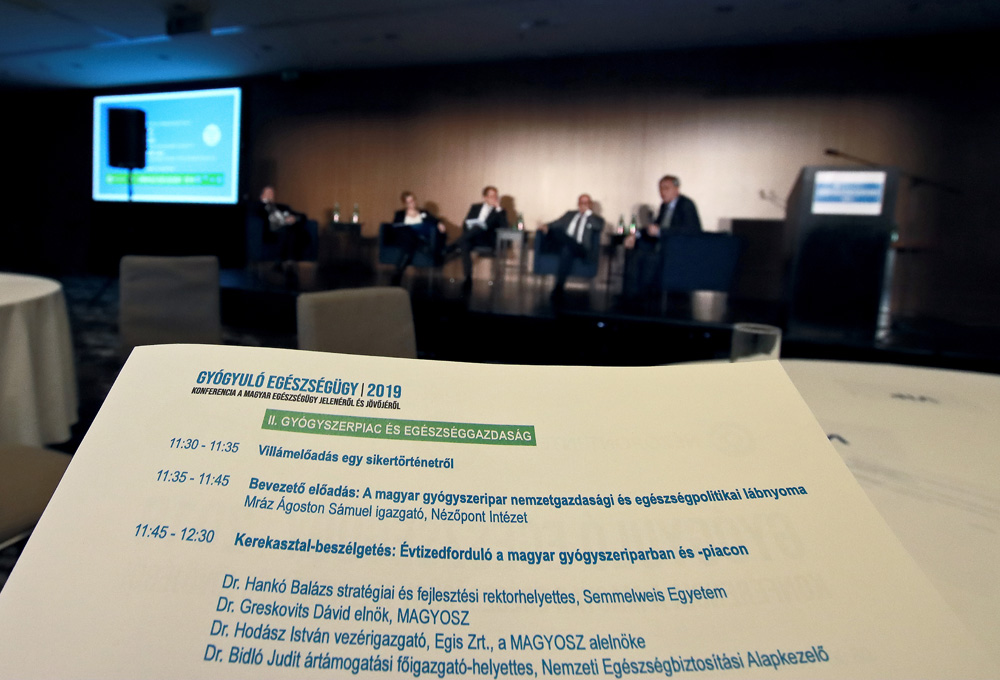Nézőpont Intézet has discussed the achievements of Hungarian healthcare and the conditions for its future success with professionals
Increasing life years spent in health is in the interest of all Hungarians, and reforms in the healthcare sector support it. Although 7 out of 10 Hungarians tend to have a good opinion about their own health, only 22 out of 100 Hungarians feel positively about healthcare, it has been said about the present and future of Hungarian healthcare at the “Healthcare in Recovery” conference.
At the conference by Nézőpont Intézet, in addition to finding out about the views of the government, attendes have also had an opportunity to learn the opinions of leaders of companies and institutions representing different segments of the healthcare industry.
In his opening speech, Head of the Ministry of Human Capacities Miklós Kásler has emphasised that the government’s goal is the prevention of disease, which is also promoted by five national health programs. In order to prevent disease, many advances have been made in recent years: public health screenings have become commonplace, hospital-acquired infections have fallen below the EU average, and the sector has been digitised. Among other things, the Minister has noted that health and medical device development and wage development are on the agenda, and that the Electronic Health Services Space will be completed in June 2020 with the incorporation of private providers. In addition, the systematic, complex development of the supply of the central region will continue within the framework of the Healthy Budapest Program.
Nézőpont Intézet CEO Ágoston Sámuel Mráz, when presenting opinion polls on the topic, has stated that only 22 percent of Hungarians have a good opinion about healthcare. The perception of this is also strongly influenced by political affiliation: 91 percent of the government-critical voters had a bad opinion of the area when surveyed. However, many successes can be reported: doctors’ gross salaries has almost tripled in the past ten years. Community health insurance coverage is considered wide even in European comparison. Vaccination rate is outstanding in Hungary. Digital health is not a dream, but an everyday reality with 800,000 e-prescriptions per day, 200,000 patient records and about 100 million doctor-patient meetings a year within the Electronic Healthcare Service Space (EESZT) framework, he has said closing his presentation.
State Secretary for Public Finances at the Ministry of Finance Péter Benő Banai has emphasised in his presentation that a healthy society is needed to sustain the growth of the Hungarian economy. According to the Secretary of State, in order for the national economy to continue to grow by two percentage points ahead of European economies, it is necessary to increase the number of years spent in health in the foreseeable future. He has emphasised that the Hungarian government, in addition to raising healthcare expenditures, has an interest in ensuring that the management of institutions and hospitals handling funds is predictable and that their debt is not repeatedly reproduced.
In his speech, Nominee Regional Director of the European Region of the World Health Organisation (WHO) Hans Kluge has addressed the current challenges of modern healthcare. In his view, healthcare, though important, is not about hospitals, but about delivering health services to problems. He has stressed the need to strengthen citizens’ confidence in primary care and outlined four priorities he identified as addressing the root causes of illness, targeting health factors outside the health sector, personalised care and access to health for all ethnic groups. In addition, he has identified the six strategic steps to achieve them. Among other things, he has stated that people’s health awareness should be improved and health security should be prepared to deal adequately with crisis situations. In addition, a unifed guide should be drawn up for the countries of the region so that they can provide better healthcare.
